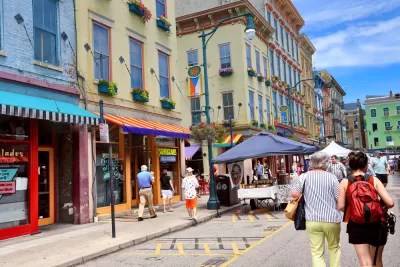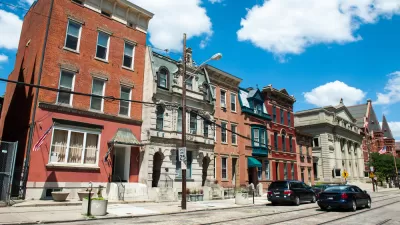The housing market in the neighborhood of Over-the-Rhine is a 'segregation machine.'

The Black population in Over-the-Rhine, one of Cincinnati's hippest urban neighborhoods, "has declined by 43% in the last decade," reports Monique John, citing recent data from the United States Census Bureau. The number of white residents in the neighborhood increased by 90 percent in the same span.
One of the most prominent narratives to emerge in the news about the latest population figures from the Census focused on the growing number of Minority groups, and the declining share of whites in the U.S. population. In the case of this revitalized urban area, the opposite seems to be true, however.
Earlham College economics professor Jonathan Diskin is quoted in the article describing the market in Over-the-Rhine as a "segregation machine."
Diskin calls the process gentrification, and says the segregation of the neighborhood has been driven by "a lack of housing subsidies or restrictions on rental costs, plus the skyrocketing costs of its market-rate units, among other issues."
Over-the-Rhine Community Council member Mike Bootes is also quoted in the article mentioning that the demographic numbers for Over-the-Rhine could help build a political coalition to support affordable housing efforts like Issue 3, which Cincinnati voters rejected at the ballot box in May 2021.
FULL STORY: Economist: For Over-the-Rhine, 'the market is a segregation machine'

Maui's Vacation Rental Debate Turns Ugly
Verbal attacks, misinformation campaigns and fistfights plague a high-stakes debate to convert thousands of vacation rentals into long-term housing.

Planetizen Federal Action Tracker
A weekly monitor of how Trump’s orders and actions are impacting planners and planning in America.

In Urban Planning, AI Prompting Could be the New Design Thinking
Creativity has long been key to great urban design. What if we see AI as our new creative partner?

King County Supportive Housing Program Offers Hope for Unhoused Residents
The county is taking a ‘Housing First’ approach that prioritizes getting people into housing, then offering wraparound supportive services.

Researchers Use AI to Get Clearer Picture of US Housing
Analysts are using artificial intelligence to supercharge their research by allowing them to comb through data faster. Though these AI tools can be error prone, they save time and housing researchers are optimistic about the future.

Making Shared Micromobility More Inclusive
Cities and shared mobility system operators can do more to include people with disabilities in planning and operations, per a new report.
Urban Design for Planners 1: Software Tools
This six-course series explores essential urban design concepts using open source software and equips planners with the tools they need to participate fully in the urban design process.
Planning for Universal Design
Learn the tools for implementing Universal Design in planning regulations.
planning NEXT
Appalachian Highlands Housing Partners
Mpact (founded as Rail~Volution)
City of Camden Redevelopment Agency
City of Astoria
City of Portland
City of Laramie





























